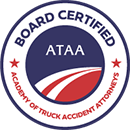Is it Safe to Drive a Truck With an Empty Trailer?
Many companies and drivers try to maximize their time and travel while moving goods across the country or state. Often, they will deliver one payload and then pick up another to move to another destination. However, sometimes, that is not possible due to a lack of cargo or other reasons. In these situations, the driver must drive the commercial truck back to its origin without an empty trailer.
How safe is this for other occupants on the road? Sometimes, those unloaded trailers can be just as dangerous as those carrying full cargo.
At Trucking Injury Law Group, we know that any truck accident has the possibility of causing serious injuries, extensive property damage, and even fatalities. There are a few reasons why empty trailers can create hazardous conditions on the road.
Maneuverability Problems with Empty Truck Trailers
Driving a vehicle with an empty load is often called deadhead trucking. In these scenarios, the driver drops off their cargo and heads to the following location without another load. One trucking company’s research suggests that at 35% of truck’s drips are deadhead without any cargo.
While many drivers are experienced and can handle empty trailers, issues can affect the vehicle’s maneuverability on the road.
When a driver tows an empty trailer, there is always the potential for swaying or fishtailing. Since it has less weight, it is prone to lateral forces. As a result, the trailer can sway back and forth or fishtail from side to side. This can be dangerous, especially at high speeds or in windy conditions.
Additionally, empty trailers can vibrate and shake more than fully loaded ones. Many times, these issues are tied to suspension problems or poor axle alignment. Even unbalanced tires or loose wheel bearings can cause an empty trailer to move in an unexpected manner.
When it comes to road conditions, empty trailers tend to experience more road bumps than loaded trailers. With any cargo, the trailer cannot absorb the impact of bumps and uneven surfaces. Also, rough roads with potholes or uneven pavement can exacerbate shaking and increase the driver’s likelihood of losing control of the truck.
An empty trailer lacks the appropriate weight that helps keep it grounded while in motion. This lack of weight distribution makes it more difficult to control. Without enough weight on the wheels, the trailer may sway or bounce around on the road, which can be dangerous for both the driver and other vehicles on the road.
Driving with an empty trailer is less stable at high speeds. Going too fast can cause the trailer to sway or bounce, leading to a loss of control or even a rollover.
With the right experience or skills, driving a truck with an empty trailer can lead to plenty of maneuverability issues on the road. Is it safe to drive a truck with an empty trailer? Let’s look at a few reasons these vehicles could be dangerous on the highway or roadway.
Are Empty Trailers Dangerous on the Road?
Is deadheading or driving an empty trailer safe? Since a driver can maneuver a vehicle with a heavy load, it should be easier when the truck doesn’t have that weight. Unfortunately, that is not true.
One study by Science X Network noted that empty trailers were two and a half times more likely to cause a collision. Trucks traveling without any cargo are more unstable due to major changes in their weight distribution.
Braking can be an issue with an unloaded trailer. When a trailer is empty, it has less weight and less traction on the road. When a driver needs to brake, it can be a challenge during braking as the wheels are more likely to lock up. In turn, a vehicle will need more stopping distance on the road. If the driver is inexperienced, they might not know how to apply gradual pressure on the brake. Instead, as they hit the brakes, it could lead to losing control of the truck and slamming into other vehicles.
Also, sudden stops or emergency braking maneuvers become riskier with an empty trailer. In these situations, the truck’s braking system may not respond as intended. The brakes may not be able to provide enough stopping power, or they may overheat and become less effective. Once again, this can increase the risk of accidents, making it more difficult for the driver to maintain vehicle control.
Empty trailers put additional stress on the tires. Since the vehicle’s weight distribution is altered, uneven tire wear results. Uneven tire wear leads to a number of issues, including tire blowouts. Uneven usage can cause the tires to fail suddenly, causing the driver to lose control of the vehicle and jackknife. Tire blowouts are dangerous. Often, they occur without warning, leaving the driver with little time to react and prevent an accident.
These trailers have a higher center of gravity than loaded ones. Once again, that is due to the lack of cargo weight. When a trailer is more top-heavy, it is prone to tipping over. Adding in wind gusts, sudden turns, or abrupt maneuvers increases the risk of rollovers. Rollovers have severe consequences. In many cases, they cause injury or even fatalities to the driver and other road users. Also, they can result in damage to the vehicle and traffic disruptions.
Traveling with an unloaded trailer can cause stress for the driver. The monotony of the route can lead to fatigue, drowsy driving, and reduced alertness. Tired drivers are more prone to making errors and have slower reaction times. The National Highway Traffic Safety Administration reported that 684 people died due to drowsy driving-related crashes. Plus, many drivers are just not trained to handle empty trailers on the roadway.
Learn More About the Dangers of Deadheading
Driving with empty trailers doesn’t always result in an accident. But sometimes, either due to the driver’s recklessness or the trucking company’s negligence, these situations can lead to serious crashes.
At Trucking Injury Law Group, if you have been injured in an accident with a deadhead trailer, we are always here to help you take the next step with your injury case.






